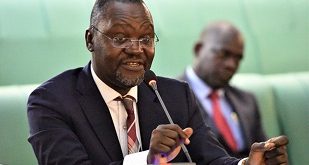
By Andrew Karamagi
The Speaker will have a hard time convincing Ugandans when she next cries wolf
Although the suspicious death of Butaleja District Woman MP Cerinah Nebanda set off a chain of events that led to the petition to recall Parliament, the legislator’s demise was not the gist of the petition. This petition was in defence of the very essence of having a parliament.
As such, there cannot be two sides to this. The Speaker, Rebecca Kadaga, brazenly disobeyed the Constitution by omitting to summon Parliament for a special sitting.
Article 95(5) is unequivocal: “Notwithstanding any other provision of this article, at least one-third of all members of Parliament may, in writing signed by them, request a meeting of Parliament; and the Speaker shall summon Parliament to meet within twenty-one days after receipt of the request.”

In no uncertain terms, Article 95(5) uses the word “shall”; the effect of the word “shall” is that it makes the recall mandatory once all the stipulated requirements have been satisfied. This provision is beyond the Speaker’s discretionary powers. It does not matter whether her personal whim is against or for the recall.
By the same token, it is immaterial what PresidentYoweri Museveni, any arm-chair analysts, regime apologists, a cabal of UPDF generals or any other individual feels, thinks, or says about the substance of the petition. The Constitution does not qualify the nature of the request to recall Parliament. It doesn’t matter if parliament wanted to discuss fashion or why the sun is shining during what should normally be the wet season!
The independence of Parliament is an irreducible minimum below which no regression is permissible.
In a democracy, it is not necessary that everyone should sing the same song. Everyone has a fundamental right to form their own opinion. The very concept of Parliament presupposes the absence of consensus and as such provides for an orderly means of finding common ground. In fact, the word Parliament was coined from the French word “parle” which means “to speak”.
Justice Twinomujuni’s words are instructive in this regard. In Charles Onyango Obbo and Another v. Attorney General he ruled that, “…conflicting views must be expressed, not because they are valid, but because they are relevant…”
President Museveni’s fears that Parliamentary immunity may be abused are unfounded and executive intervention, ostensibly to promote the truth is unnecessary. All ideas should be allowed to compete for allegiance the same way goods within a free market structure compete for demand. The truth will be accepted and false ideas will, like unwanted goods be rejected.
The Speaker’s claims about forged signatures cannot pass without mention because proof about the authenticity (or the lack thereof) of a signature is beyond the Speaker’s purview. Other than Minister Rose Namayanja’s unsubstantiated claims, Kadaga has not presented a handwriting expert’s opinion proving that any signature was forged. But let us assume that the forgery actually happened. It still would not warrant rejection since it is only one Member of Parliament (Hon. Fred Ebil), who claimed that his signature was forged—the number of valid signatures would still meet the minimum number of petitioners prescribed by the Constitution. Withdrawal of signatures is unfounded and as such was a nullity.
With one stroke of the pen, Kadaga has set a terrible precedent that will encourage more effrontery from the President. Compared to the Judiciary which firmly repelled and roundly condemned the siege of the High Court, parliament has consented to the rape. The Speaker will have a hard time convincing Ugandans when she next cries wolf.
While I share the general public’s frustration about the abysmal quality of debate and general lack of seriousness in the House, it should not be lost on us that Parliament cannot get better without first establishing its independence. Gagging it will not help.
Andrew Karamagi works at HURIPEC-School of Law, Makerere University
 The Independent Uganda: You get the Truth we Pay the Price
The Independent Uganda: You get the Truth we Pay the Price



